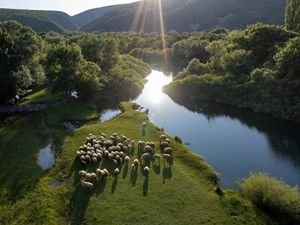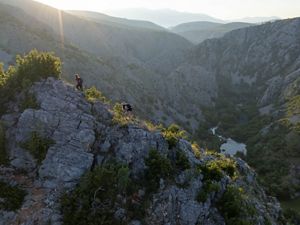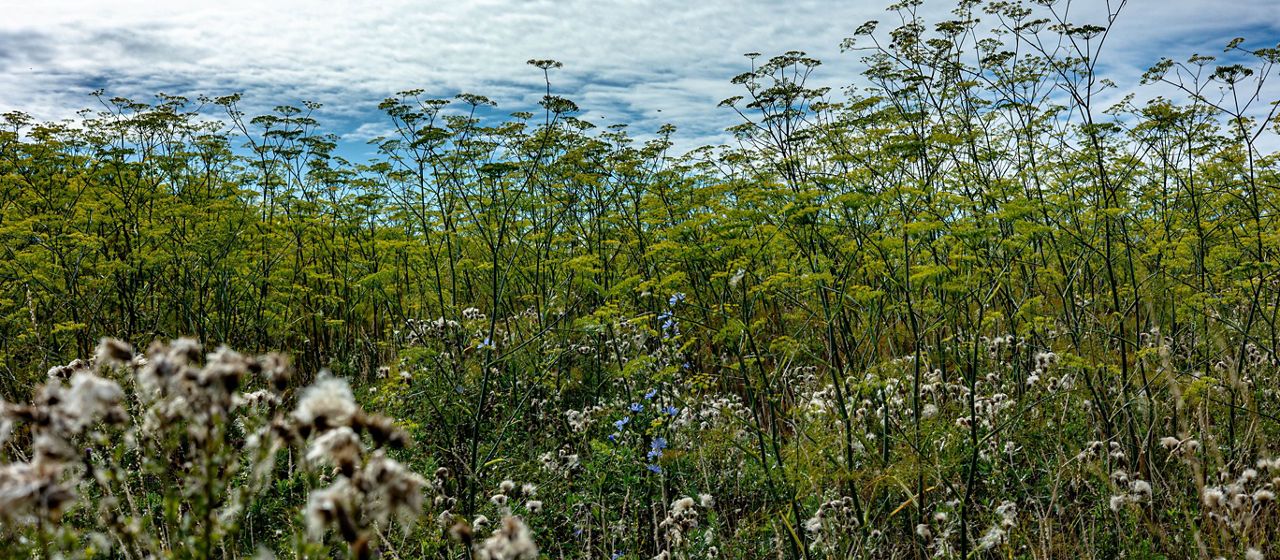
Restoring nature Fennel grows wild on former farmland in Norfolk, England as part of an initiative to introduce nature-based solutions at landscape-scale. © Lucy Carrigan
Fennel grows wild in a field, dappled sky behind it, while in front lush verges with wildflowers in abundance. A meadow as the sun sets, dragonflies flit from one plant to another, bees hum in amongst the long grasses immersed in their evening ritual of gathering pollen. Bursts of blues, yellows, purples and reds sway across a bucolic landscape, buffeted by a light evening breeze.

Map of western England showing the location of the Wendling Beck Environment Project, with a smaller map in the upper right showing the location of Norfolk, England within the United Kingdom.
Three years ago, this was arable land and sugar beet was growing here. Today, this is biodiversity restored at landscape scale in Norfolk, England. It is part of the Wendling Beck Environment Project (WBEP): a habitat creation, nature restoration and regenerative agriculture initiative spearheaded by four neighboring farmers who are piloting nature-based solutions to significantly alter the way they farm, and offer solutions to the climate crisis that are both financially and environmentally resilient.
“Farmers, historically, have not been good at collaborating,” says Glenn Anderson, farm manager at Dillington Hall Estate, and the project lead. “Generally, farming can be quite an isolated profession, something only starting to change now. In the past, farmers didn’t think about connecting blocks of land to benefit nature.”
Rosie Begg, co-lead on the project, describes how she, Glenn and neighboring farmers, Tom Cross and the Bullard Family, began to shift their mindset. “We started to realize that although you can do amazing things on your farm, the way to get far more returns for nature is to join up with others and work on a landscape scale. Nature doesn't adhere to our farm boundaries and so, although the work we were doing individually was good, it wasn't necessarily the best thing for nature.”

Glenn Anderson holds hay on his farm in Norfolk, England.
Working With Nature, Not Against It
Norfolk is particularly vulnerable to climate change. This low-lying county with a long coastline receives only 70 percent of the UK’s average rainfall, which is exacerbated by high evaporation loss, specifically as a result of arable farming. 59 of Norfolk’s 129 river catchments are already over-abstracted or over-licensed. The local water supply company, Anglian Water, predicts that by 2050, water demand in Norfolk could exceed supply by between five and 17 percent.
This project is named for the Wendling Beck, a chalk stream that runs across the landscape. Dry in the summer, flooded in winter and in environmental parlance, “over-nutrified,” Wendling Beck mirrors the challenges faced in the rivers and streams across Norfolk.
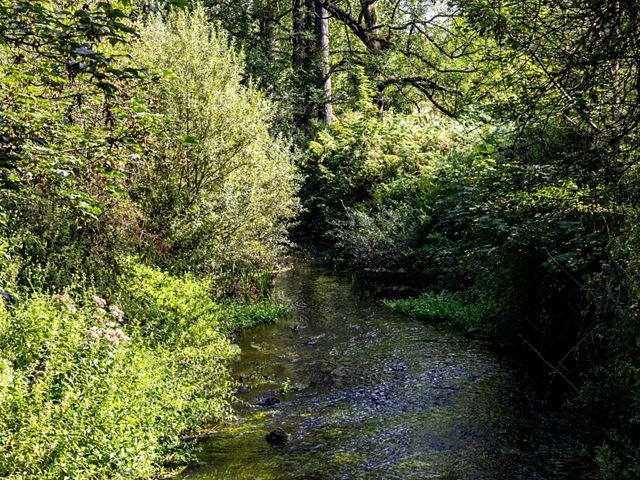
The Wendling Beck is a chalk stream that flows through Norfolk, England.
Begg farms blackcurrants and plums on her farm that adjoins Glenn’s on the small winding country roads outside the market town of Dereham. While she learned to farm conventionally, it became increasingly clear that conventional farming methods are not sustainable.
“Over the last four years we've had the coldest winter on record, the wettest summer on record, the driest and hottest summer on record and the wettest spring on record. Farming is not resilient to these changes.” And, she adds, “All of the people I love live in this community, and yet we are using products that are harmful.”
Historically, much of Norfolk was heathland—sandy soil not suitable for arable farming—but for the use of fertilizers and pesticides, which have eroded its natural state, released carbon into the atmosphere and polluted its rivers and streams. Farming here has been largely reliant on subsidies through the EU’s Common Agriculture Policy (CAP). As of 2027, those subsidies will stop.
Begg practices regenerative farming to work with nature, as opposed to against it. “You don’t have to fight nature all the time,” she says. “Restoring nature and growing nutritious, healthy food in a way that is positive, is exciting, and a fun way to grow. And it’s not as stressful.”
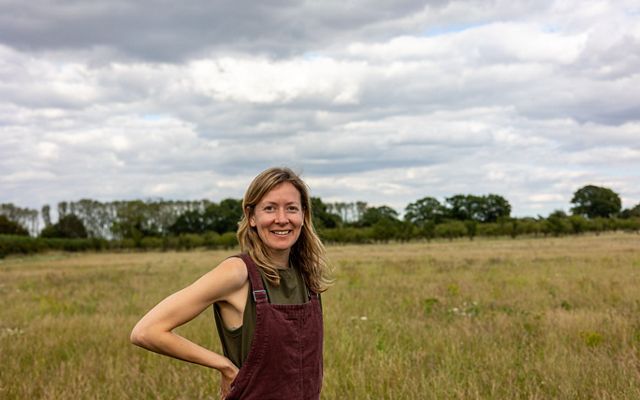
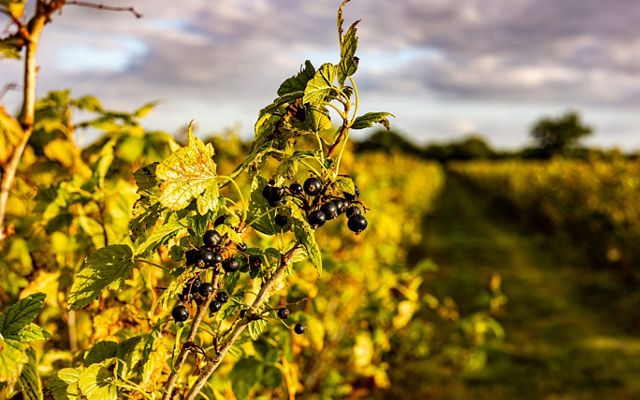
Rob Cunningham, the Europe Program Director for Resilient Watersheds at The Nature Conservancy, provides technical support to the Wendling Beck team. “Just shifting from conventional agriculture to regenerative agriculture—and moving away from arable farming—to instead focusing on species rich habitat, low impact grazing and species rich grassland will have significant benefits to the water quality in that catchment,” he says.
A New Agricultural Business Model
The key to Wendling Beck’s success will be its financial viability. “Farmers are rational people,” says Anderson. “There has to be a self-sustaining finance model to be able to do this.”
These farmers are testing opportunities presented by the development of financial mechanisms to protect and restore biodiversity in nature. One key mechanism is Biodiversity Net Gain. Beginning in November 2023, developers across the UK, with few exceptions, must include Biodiversity Net Gain in their planning applications. This means that while every effort must be made to protect biodiversity in the first place, any piece of habitat that is disrupted in the building of new housing or infrastructure must be replaced, either on-site, or in an alternate landscape, with the added commitment from developers that the biodiversity in that space will be improved by a minimum of 10 percent.
“This is a good way of using the environment as the central pillar of economic growth,” Anderson says. “It is an opportunity for landowners to use ecosystem services and land-use change to build financial resilience into their businesses.”
Quote: Sophie Trémolet
These farmers are pioneers... They are providing inspiration, not only for other farmers, but also policymakers across Europe who are exploring ways to develop this kind of biodiversity market.
“These farmers are pioneers,” says Sophie Trémolet, Europe Freshwater Director at The Nature Conservancy. “They are providing inspiration, not only for other farmers, but also policymakers across Europe who are exploring ways to develop this kind of biodiversity market.”
WBEP is in its fourth year. In addition to The Nature Conservancy, its partners include Norfolk Wildlife Trust, Norfolk County Council, Norfolk Rivers Trust, Norfolk Farming and Wildlife Advisory Group and Anglian Water—all united by a common mission to restore biodiversity and protect Norfolk’s rivers and streams.
Sowing the Seeds of Change
In the last 18 months, the project has restored 10% of the 2,000 acres in its remit. The team’s vision is to create a diverse mosaic of different habitats—lowland heath in one place, species-rich grassland or wetland restoration in another—leaving space for regenerative agriculture and embracing ecotourism. They have referred to historical maps of the area. They look for clues in the hedgerows as to what came before and has been washed away since, and they are restoring it.


On what recently was a potato field, now is the start of the wood pasture that used to be there, with trees planted in the very places where they stood hundreds of years ago. They have created bird berry blocks, “full of fruiting shrubs,” says Anderson, and seed-rich fields that will provide “over winter feeding food,” for the farmland birds.
“If you look at farming over the years, it responds to the needs of the time,” says Anderson, himself a fifth-generation farmer. “That’s what we are doing by focusing on nature and climate resilience. We're responding to the needs of our time in the way that we're using the land.”
About the Creator
Lucy Carrigan is an independent storyteller and photographer based in London. She writes on climate and migration.

